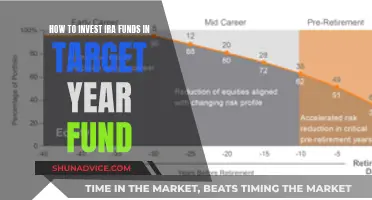
Artificial intelligence is an increasingly popular investment theme, with a growing number of mutual funds and exchange-traded funds (ETFs) offering exposure to the sector. AI-based mutual funds are a type of investment vehicle that pools money from multiple investors to purchase stocks, bonds, and other securities related to artificial intelligence. These funds are managed by professional fund managers who bring expertise and use research and market analysis to decide which AI-related assets to buy and sell.
Some of the best-known AI mutual funds and ETFs include the Global X Robotics & Artificial Intelligence ETF, the ROBO Global Robotics and Automation Index ETF, the iShares Robotics and Artificial Intelligence ETF, and the First Trust Nasdaq Artificial Intelligence and Robotics ETF. These funds offer investors a diversified portfolio of companies working in robotics, automation, and artificial intelligence.
When considering investing in AI mutual funds, it is important to assess the fund's track record, fees, and overall performance. While AI offers exciting investment opportunities, it is also a new and rapidly changing industry with inherent risks and volatility.
What You'll Learn

Robotics funds
VanEck Robotics ETF
The VanEck Robotics ETF (NASDAQ: IBOT) is designed to track the performance of companies specialising in industrial automation and production, non-industrial automation, and autonomous vehicles. IBOT currently holds around 85 stocks, including major companies such as NVIDIA Inc., Emerson Electric, and ABB Ltd. With an expense ratio of 0.47%, it offers a competitive option for investors.
Global X Robotics and Artificial Intelligence Thematic ETF
The Global X Robotics and Artificial Intelligence Thematic ETF (NASDAQ: BOTZ) aims to follow the Indxx Global Robotics & Artificial Intelligence Thematic Index. This fund provides exposure to a diverse range of companies, including those working on hardware and software in the robotics and AI industry. BOTZ includes prominent companies such as Nvidia, Intuitive Surgical, and Keyence Corp. However, it has a relatively high expense ratio of 0.68%.
ROBO Global Robotics and Automation ETF
The ROBO Global Robotics and Automation ETF (NYSEARCA: ROBO) is actively managed by ROBO Global, a leading provider of robotics and automation investment management services. The fund's portfolio is diversified across multiple countries and sectors, including healthcare, industrial automation, and AI. Some of its top holdings include Yaskawa Electric Corp, ABB Ltd., and Teradyne Inc. While ROBO has shown strong returns, it also has a high expense ratio of 0.95%.
IShares Robotics and Artificial Intelligence Multisector ETF
The iShares Robotics and Artificial Intelligence Multisector ETF (NYSEARCA: IRBO) tracks an index of global equities in robotics and AI. This fund offers exposure to companies at the forefront of these technologies, including Meta Platforms, Nvidia, and Apple. IRBO has a relatively low expense ratio of 0.47% compared to its peers.
First Trust Nasdaq Artificial Intelligence and Robotics ETF
The First Trust Nasdaq Artificial Intelligence and Robotics ETF (ROBT) offers pure-play exposure to AI by categorising companies into enablers, engagers, and enhancers based on their involvement in the AI ecosystem. The ETF assigns different weights to each category, with engagers receiving 60%, enablers 25%, and enhancers 15%. ROBT has a competitive expense ratio of 0.65%.
Retirement Mutual Funds: Where to Invest for a Secure Future
You may want to see also

Machine learning/deep learning funds
Machine learning and deep learning funds focus on technologies like facial recognition software, virtual personal assistants (VPAs), chatbots and other machine learning tools. These funds offer investors exposure to companies leading the way in developing the future of AI technology.
- Fidelity Select Technology Portfolio: This mutual fund has a diversified portfolio of 30-plus stocks and securities, many of which are related to machine learning and big data analytics, including companies such as Microsoft and Nvidia. It has a track record spanning over 40 years and has returned 19.92% annually over the past 10 years, outperforming its benchmark index.
- ROBO Global Robotics and Automation ETF: This ETF is actively managed by ROBO Global, one of the world's largest providers of robotics and automation investment management services. The fund's portfolio is diversified across multiple countries and sectors, including healthcare, industrial automation and AI. Some top holdings include Yaskawa Electric Corp, ABB Ltd and Teradyne Inc. With a strong track record of returns, ROBO is a great option for investors looking to enter the AI market.
- IShares Robotics and Artificial Intelligence Multisector ETF: This ETF aims to track an index of global equities in robotics investments and the AI sector. The fund offers exposure to firms at the forefront of robotics and AI technology, including Meta Platforms, Nvidia and Apple. With a relatively low expense ratio of 0.47% and solid returns over several years, it is a good option for investors bullish on AI's long-term growth.
- First Trust Nasdaq Artificial Intelligence and Robotics ETF: This ETF tracks the Nasdaq CTA Artificial and Robotics index, which includes companies engaged in AI and robotics in technology, industrials and other sectors. The fund offers an expense ratio of 0.65% and a dividend yield of 0.27%. Its top holdings include SentinelOne, Appian and Palantir.
- Global X Robotics and Artificial Intelligence ETF: This ETF was established in 2016 and invests in companies that benefit from increased adoption and utilisation of robotics and AI. Its top five holdings include Nvidia, ABB, Intuitive Surgical, Keyence and SMC Corp. With a modest dividend yield of 0.3% and a reasonable expense ratio of 0.68%, it is well-suited for growth-oriented investments.
Venture Capital's XAI Investment: Who's Leading the Pack?
You may want to see also

AI-managed mutual funds
AI-managed funds can help investors diversify their portfolios, decrease risk, and generate higher returns than individual security investments. They are also a great way to invest in the massive hype around the artificial intelligence revolution without having to buy individual stocks.
Some key categories of AI funds include robotics funds, which invest in companies that design and build robots for industrial, medical, or military applications, and machine learning/deep learning funds, which focus on computer vision technologies like facial recognition software, virtual personal assistants, and chatbots.
When choosing an AI mutual fund, it is important to consider factors such as its track record of returns and the fees involved, as these can vary significantly between different types of AI mutual funds. It is also important to remember that, like any investment, there are risks involved with AI funds due to the new and rapidly changing nature of the industry.
- VanEck Robotics ETF (NASDAQ: IBOT)
- Global X Robotics and Artificial Intelligence Thematic ETF (NASDAQ: BOTZ)
- Fidelity Select Technology Portfolio
- Fidelity Disruptive Automation ETF (NASDAQ: FBOT)
- ROBO Global Robotics and Automation ETF (NYSEARCA: ROBO)
- IShares Robotics and Artificial Intelligence Multisector ETF (NYSEARCA: IRBO)
- T. Rowe Price Science and Technology Fund
Index Funds: Where to Start and What to Know
You may want to see also

AI ETFs
- Technology ETFs: These funds invest in a broad range of technology stocks, including large companies that are key players in the AI industry, such as NVIDIA and Microsoft.
- Thematic ETFs: These funds specifically focus on the theme of AI and may hold companies working on AI hardware, software, or related fields like robotics and automation.
- AI-Enhanced or AI-Powered ETFs: This type of ETF uses AI technology to inform its trading decisions but may not solely invest in AI stocks.
- Invesco AI and Next Gen Software ETF (IGPT): This ETF offers exposure to large-cap tech companies in the AI space, including Alphabet, Nvidia, and Meta. It has a 0.6% expense ratio.
- Global X Artificial Intelligence & Technology ETF (AIQ): AIQ provides broad exposure to the AI value chain, similar to the Nasdaq-100 but with a tilt towards technology and mid-cap growth companies. It has a 0.68% expense ratio.
- Global X Robotics & Artificial Intelligence ETF (BOTZ): BOTZ is a niche play on applied automation, with a focus on industrial and healthcare companies deploying AI and robotics. It has an identical 0.68% expense ratio to AIQ.
- Roundhill Generative AI & Technology ETF (CHAT): CHAT targets hardware and software companies developing or supporting generative AI, such as Nvidia, Microsoft, and Meta. It has a higher expense ratio of 0.75%.
- First Trust Nasdaq Artificial Intelligence and Robotics ETF (ROBT): ROBT offers pure-play exposure to AI by classifying companies into enablers, engagers, and enhancers based on their involvement in the AI ecosystem. It has a 0.65% expense ratio.
- IShares Robotics and Artificial Intelligence Multisector ETF (IRBO): IRBO passively tracks a global index of robotics and AI companies, providing diversification across small- and mid-cap stocks. It has a lower expense ratio of 0.47%.
When considering investing in AI ETFs, it is important to assess your risk tolerance, investment goals, and conduct thorough research into the funds' historical performance and fees.
Best Funds to Invest in: Where to Start?
You may want to see also

AI stocks
While I am unable to find information on the performance of individual stocks, I can provide you with some general information on investing in AI stocks through mutual funds and some of the top-performing AI stocks.
Investing in AI Stocks Through Mutual Funds
AI-based mutual funds are a popular type of investment vehicle that pools money from multiple investors to purchase artificial intelligence stocks, bonds, and other securities. They can help investors diversify their portfolios, reduce risk, and potentially generate higher returns than individual security investments. AI funds are unique in that they specifically focus on opportunities in artificial intelligence and are managed by professional fund managers with expertise in this field.
Some key categories of AI funds include:
- Robotics funds: These funds invest in companies that design and build robots for industrial, medical, or military applications, including drones, artificial limbs, and driverless cars.
- Machine learning/deep learning funds: These funds focus on computer vision technologies like facial recognition software, virtual personal assistants (VPAs), chatbots, and other machine learning tools.
When choosing an AI mutual fund, it is essential to consider factors such as its track record of returns, fees, and the level of risk involved.
Top-Performing AI Stocks
- Microsoft (MSFT)
- Nvidia (NVDA)
- Tesla (TSLA)
- Apple (AAPL)
- Palantir (PLTR)
- Salesforce (CRM)
- Meta Platforms (META)
- Arista Networks (ANET)
Other notable mentions include:
- Broadcom (AVGO)
- Qualcomm (QCOM)
- ARM Holdings (ARM)
- Marvell Technologies (MRVL)
- Advanced Micro Devices (AMD)
- Alphabet (GOOGL)
- Amazon.com (AMZN)
AI Exchange-Traded Funds (ETFs)
AI exchange-traded funds (ETFs) are another way to invest in artificial intelligence. These are publicly traded baskets of AI stocks, which are shares of publicly traded companies involved in AI development. Here are some of the best-performing AI ETFs, according to NerdWallet:
- Invesco AI and Next Gen Software ETF (IGPT)
- Global X Artificial Intelligence & Technology ETF (AIQ)
- Global X Robotics & Artificial Intelligence ETF (BOTZ)
- Roundhill Generative AI & Technology ETF (CHAT)
- First Trust Nasdaq Artificial Intelligence and Robotics ETF (ROBT)
- IShares Robotics and Artificial Intelligence Multisector ETF (IRBO)
Semi-Short-Term House Fund: Where to Invest?
You may want to see also
Frequently asked questions
Some mutual funds that invest in artificial intelligence include the Global X Robotics & Artificial Intelligence ETF, the ROBO Global Robotics and Automation Index ETF, and the iShares Robotics and Artificial Intelligence ETF.
Investing in mutual funds that focus on artificial intelligence can provide diversification and potentially lower risk compared to investing directly in individual AI-related stocks. Mutual funds in this sector are managed by experienced professionals who conduct market analysis to decide which AI-related stocks and securities to buy and sell.
When choosing a mutual fund that invests in artificial intelligence, it is important to consider the fund's track record, fees, and level of diversification. Additionally, as AI is a rapidly changing industry, it is crucial to understand the associated risks and volatility.







